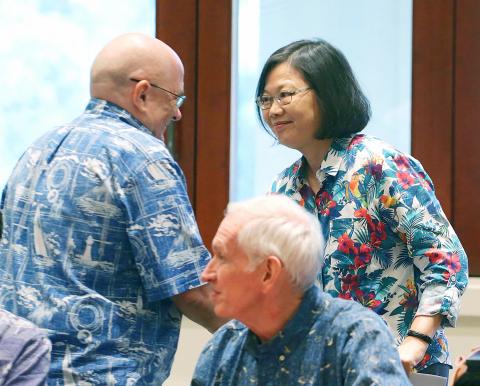Amid US concern over a growing military imbalance between Taiwan and China, President Tsai Ing-wen (蔡英文) has promised to boost the nation’s defense budget by at least 2 percent annually, National Security Council (NSC) Deputy Secretary-General Tsai Ming-yen (蔡明彥) said yesterday.
The 2 percent increase will be in line with the projected growth of the nation’s economy, the president said, adding that the defense budget might even be increased by 3 percent if the need arises, Tsai Ming-yen said.
A special reserve fund is also to be allocated for major military procurements, Tsai Ming-yen told reporters, citing the president, who is on the first leg of a three-nation visit to allies in the Pacific.

Photo: CNA
He said Tsai Ing-wen made the pledge on Saturday during a meeting in Honolulu, Hawaii, with American Institute in Taiwan (AIT) Chairman James Moriarty after AIT officials urged her to heed the US’ concerns about Taiwan’s comparatively small defense budget.
Noting that China’s military spending has been seeing double-digit growth each year, Moriarty told Tsai Ing-wen that such a trend could result in an even greater imbalance in military strength across the Taiwan Strait, the NSC boss said.
The president told Moriarty that Taiwan was drawing up a comprehensive plan to meet its long and short-term military needs, particularly to strengthen its defense capabilities, Tsai Ming-yen said.
Taiwan’s military procurement budget for next year, which has already been approved, is NT$83.3 billion (US$2.76 billion), lower than this year’s NT$88 billion, according to a China Times report.
Speaking later at a seminar at the East-West Center in Honolulu, Tsai Ing-wen said she welcomed the US’ commitment to peace and security in the Asia-Pacific region.
Taiwan can see this commitment as US President Donald Trump is about to visit five nations in the region starting on Friday, she said.
The US must secure strong and stable partnerships with its allies and friends in the Asia-Pacific region, including Taiwan, to maintain peace and security in the region, she said.
She also expressed appreciation for the US’ arrangements for her stopovers in Honolulu, and said relations between Taiwan and the US have been getting increasingly better, adding Taiwan’s ties with the US have never been stronger and that the partnership was important to maintain peace in Asia.
Her visit to the three diplomatic allies was in line with the wish of Taiwanese to reach out to the world, she said, and she hoped to forge a solid cooperative partnership with Taiwan’s friends in the Pacific to create peace and prosperity in the region.

AGING: As of last month, people aged 65 or older accounted for 20.06 percent of the total population and the number of couples who got married fell by 18,685 from 2024 Taiwan has surpassed South Korea as the country least willing to have children, with an annual crude birthrate of 4.62 per 1,000 people, Ministry of the Interior data showed yesterday. The nation was previously ranked the second-lowest country in terms of total fertility rate, or the average number of children a woman has in her lifetime. However, South Korea’s fertility rate began to recover from 2023, with total fertility rate rising from 0.72 and estimated to reach 0.82 to 0.85 by last year, and the crude birthrate projected at 6.7 per 1,000 people. Japan’s crude birthrate was projected to fall below six,

US President Donald Trump in an interview with the New York Times published on Thursday said that “it’s up to” Chinese President Xi Jinping (習近平) what China does on Taiwan, but that he would be “very unhappy” with a change in the “status quo.” “He [Xi] considers it to be a part of China, and that’s up to him what he’s going to be doing, but I’ve expressed to him that I would be very unhappy if he did that, and I don’t think he’ll do that. I hope he doesn’t do that,” Trump said. Trump made the comments in the context

SELF-DEFENSE: Tokyo has accelerated its spending goal and its defense minister said the nation needs to discuss whether it should develop nuclear-powered submarines China is ramping up objections to what it sees as Japan’s desire to acquire nuclear weapons, despite Tokyo’s longstanding renunciation of such arms, deepening another fissure in the two neighbors’ increasingly tense ties. In what appears to be a concerted effort, China’s foreign and defense ministries issued statements on Thursday condemning alleged remilitarism efforts by Tokyo. The remarks came as two of the country’s top think tanks jointly issued a 29-page report framing actions by “right-wing forces” in Japan as posing a “serious threat” to world peace. While that report did not define “right-wing forces,” the Chinese Ministry of Foreign Affairs was

PREPAREDNESS: Given the difficulty of importing ammunition during wartime, the Ministry of National Defense said it would prioritize ‘coproduction’ partnerships A newly formed unit of the Marine Corps tasked with land-based security operations has recently replaced its aging, domestically produced rifles with more advanced, US-made M4A1 rifles, a source said yesterday. The unnamed source familiar with the matter said the First Security Battalion of the Marine Corps’ Air Defense and Base Guard Group has replaced its older T65K2 rifles, which have been in service since the late 1980s, with the newly received M4A1s. The source did not say exactly when the upgrade took place or how many M4A1s were issued to the battalion. The confirmation came after Chinese-language media reported